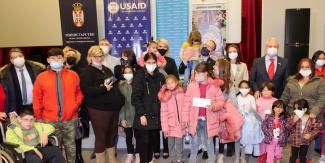Boljevac - April 19, 2021 - Darija Kisić Tepavčević, Minister of Labour, Employment, Veteran and Social Affairs, Anthony Godfrey, U.S. Ambassador to the Republic of Serbia, Deyana Kostadinova, UNICEF Representative in Serbia, and Dragan Radovanović, President of the Red Cross of Serbia distributed debit cards, with a predetermined amount of funds, to families with children from Boljevac whose incomes were significantly impacted by the COVID-19 pandemic.
The Study on the Effects of the COVID-19 Pandemic on Families With Children in Serbia, conducted by UNICEF in April 2020, has shown that the crisis significantly affected the income of households with children, and in almost 50% of these households, there was a decline in income. In addition, 1 in 4 households with children had unplanned expenses, while the most common categories of unplanned expenses were hygiene and food items. In almost 40% of households, the amount for unplanned expenses was higher than a quarter of the monthly household income.
“One of the priorities of the Ministry of Labour, Employment, Veteran and Social Affairs is the care of all citizens, and especially those who need help the most. This did not change even during the COVID-19 pandemic, which has greatly affected the whole world. The Government of the Republic of Serbia, even in the conditions of a pandemic, continuously took care of the needs of all citizens, especially those most vulnerable,” said Prof. Dr. Darija Kisić Tepavčević, Minister of Labour, Employment, Veteran and Social Affairs.
The humanitarian cash benefit programme is being implemented in Southern and Eastern Serbia by UNICEF and the Red Cross of Serbia thanks to the financial support provided by the United States Agency for International Development (USAID) in the amount of $600,000 USD.
“For all of the families who will be receiving these cards, I want you to know that we understand your struggles and hope these cards will help you.... I truly believe that together -- we will get through this and come out stronger,” said Anthony Godfrey, U.S. Ambassador to the Republic of Serbia.
“Cash benefits for families with children are an extremely important type of support for those most vulnerable in times of crises. Even before the COVID-19 pandemic, 7% of people in Serbia lived absolute poverty, and we know that financial shocks mostly affect children from the poorest families. The goal of the humanitarian cash programme, which we are implementing in Southern and Eastern Serbia together with the Red Cross and with the financial support of USAID, is to help vulnerable families satisfy their material needs and enable children to have a more fulfilled childhood during the pandemic,” said Deyana Kostadinova, UNICEF Representative in Serbia.
The President of the Red Cross of Serbia, Prof. Dr. Dragan Radovanović, thanked UNICEF and USAID, as well as other donors for their exceptional cooperation, and especially for the assistance provided to the most vulnerable households within the Mitigating the Effects of the COVID-19 Pandemic on the Socio-Economic Status of Children and Their Families project.
“Since the beginning of the epidemic caused by the COVID-19 virus, the Red Cross of Serbia has been extremely active in local communities, providing assistance to those who need it the most. With this kind of help, we are mitigating the effects of the COVID-19 pandemic crisis on the socio-economic status of children and their families, who are most vulnerable, and thus strengthening faith in solidarity that traditionally exists in our society.” said Prof. Dr. Dragan Radovanovic.
Families selected for this programme will be awarded a predetermined amount of funds that corresponds to the size of the family. The money is provided to families, in cooperation with the Komercijalna banka, via a debit card with a predetermined amount on it. Debit cards allow maximum flexibility in spending, as well as the inclusion of families in payment mechanisms they may not have had the chance to use before, but which are safer to use, especially during a health crisis.

UNICEF Srbija
